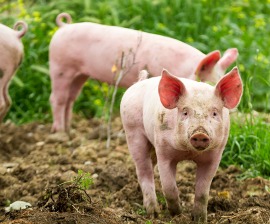
Hopeful news for animals. Shaiith/istock
Mexico City/Brussels—Humane Society International has cautiously welcomed the conclusion of negotiations for the modernisation of the Free Trade Agreement between the European Union (EU) and Mexico. A summary of the ‘agreement in principle’ has been released, but still requires additional fine-tuning, legal scrubbing and ratification by both parties.
The modernised agreement will include a trade and sustainable development (TSD) chapter with environmental provisions, including cooperation on issues ranging from tackling wildlife trafficking, Illegal, Unreported and Unregulated (IUU) fishing and overfishing. Furthermore, the agreement will also seek to strengthen cooperation between parties with respect to farm animal welfare.
Anton Aguilar, executive director for Humane Society International/Mexico, said:
“We are delighted that this trade agreement will include commitments to sustainable development, particularly with regard to illegal wildlife trade. HSI has been pushing hard—from both sides of the Atlantic—for the negotiators to ensure the inclusion of strong provisions for the protection of animals in this trade deal. It is vital that both Mexico and the EU commit to working together to properly implement and enforce multilateral environmental agreements, such as CITES, and cooperate to combat wildlife trafficking. CITES is the Convention on International Trade in Endangered Species of Wild Fauna and Flora. Mexico is a notorious hub for the export of illegal wildlife products, which are often shipped from other parts of Latin America and are destined primarily to the U.S., but also to the EU, which (alongside the U.S. and China) is the one of the top three destinations for illegal wildlife in the world.”
Joanna Swabe, HSI/Europe’s senior director for public affairs, added:
“While it is heartening to see both the EU and Mexico pursing a values-based trade agenda and making robust environmental commitments, particularly with regard to the protection of wildlife and biodiversity, the devil will, as ever, be in the details. It remains to be seen just how strong the provisions in the final text will actually be and how they will eventually be implemented. In this regard, HSI hopes to participate in the Domestic Advisory Groups that will be established in both the EU and Mexico to help civil society participate in and oversee this aspect of the agreement. Aside from the TSD chapter, it is great news that the modernised EU-Mexico Free Trade Agreement will now include provisions on animal welfare. The question is whether these will go beyond improving the implementation of the World Organization for Animal Health (OIE) standards? Again, it is a case of waiting and watching for the text of the final agreement.”
The agreement reached between the EU and Mexico is part of a broader, modernised EU-Mexico Global Agreement. Practically all trade in goods between the EU and Mexico will now be duty-free, including in the agricultural sector. Since the previous EU-Mexico trade agreement came into force in 2000, trade between the EU and Mexico has risen at a rate of around 8 percent per year, resulting in an overall increase of 148 percent in trade in goods over the period. Despite these positive results, there was still a wide margin for improving the trade relationship. HSI, through its offices in Mexico and Brussels, worked with trade officials to advocate for animal protection language to be included in the agreement. While we expect the final text to be a significant step forward as compared to the previous version of the agreement, it remains to be seen if it will have a comparable level of ambition with other international treaties like the Trans Pacific Partnership, to which Mexico is a signatory.
Facts
According to the summary of the ‘agreement in principle’, some of the highlights of the agreement are:
Trade and Sustainable Development
- The TSD Chapter includes provisions on the fight against climate change and the transition to a sustainable low-carbon economy, referencing the Paris Agreement. It also identifies potential areas where trade and climate change agendas can reinforce each other such as: the conservation and sustainable management of the biological resources, forests and fisheries, the promotion of trade in legally harvested and sustainable products or promotion of low-carbon technologies and energy efficiency.
- Key relevant international instruments include the Convention on International Trade in Endangered Species of Wild Fauna and Flora, the Convention on Biological Diversity and fisheries instruments at global and regional level.
- Disagreements or controversies on any matters arising under the TSD chapter are solved by using the governmental bodies (Trade and Sustainable Development or the Trade Committees), government-to-government consultations and a mechanism for impartial assessment of serious issues through an independent Panel of Experts and the publication of a public report with recommendations. The report can serve as a catalyst for further dialogue between the Parties and for civil society to take up through their dialogue with the Parties.
Animal Welfare (AW) and Antimicrobial Resistance (AMR)
- The Modernization of the agreement has led to a fully-fledged Chapter on AW/AMR, providing many specific commitments for enhanced cooperation. For AW, both sides agree to improve the implementation of the OIE standards. This is in line with EU policies of supporting the development and improved implementation of OIE AW standards.
Media contact: Magaly Garibay, mgaribay@idee.agency +52 55 38762199
